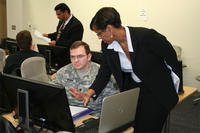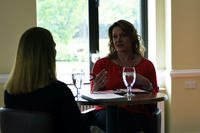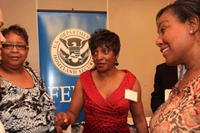When Halley moved to Camp Lejeune, she knew she wanted a job. In fact, she knew exactly what job she wanted. And on the day of an MCCS job fair, she lined up with 250 other applicants all hoping to be hired for that one job.
Halley didn’t let herself get discouraged. She may have been new to the area, but she had taken advantage of the job search resources available to her aboard her Marine Corps base. And when you are a Marine spouse in the market for a new job, the base is your best place to start looking.
Related: Does your resume pass the 6-second test? Get a FREE assessment.
Marine Corps Spouse Employment Resources
Even if you don’t have a draft of your resume ready, your first stop should be the Career Assistance Branch or Career Resource Management Center. Every Marine Corps base has one or the other, and for the duration of your job search, these offices, which perform virtually the same role, should be your home base.
The knowledgeable staff can provide basic job search assistance and resume help, no matter where you are in the process. They offer a variety of workshops and seminars, some of which, like the inventory of skills class, are worth doing no matter where you are in your job search or professional life.
Another great resource is Marine Corps Community Services (MCCS). MCCS is the clearinghouse for most civilian jobs on base, so they have a wealth of aids to help with job applications.
Helping Getting a Job
Whether or not you’re applying to an MCCS job or a job off base, all of their programs are open to you. MCCS is known for its particular application process (it only recently abandoned KSA’s for the new Assessment Questions) and to help you execute them well, they have a number of onsite aids, including sample assessment question responses for you to look through as you construct your own.
Many companies – and the federal government - have similarly quirky applications, so making use of the MCCS resources will not only strengthen your case if you decide to apply on base, it will also help you in your job search in the civilian market.
MCCS also hosts a number of job fairs throughout the year, like the one that Halley attended. They usually have a theme – she attended one for jobs in education – but each are good on-the-ground exposure as you make your way from job applicant to employee.
These job fairs can be overwhelming, especially when 250 people are in line for the same job. But Halley didn’t let the crowd deter her from her goal. She maximized on the face time the job fair afforded her and followed the advice of the MCCS recruiters as she navigated the recruiting process.
“Definitely fill out the spouse preference form,” says Halley. “And have every piece of training you’ve ever done – diplomas, CPR, anything – in your application.” Experience matters.
Related: For the latest veteran jobs postings around the country, visit the Military.com Job Search section.
Consider Volunteering
MCCS also offers a variety of volunteer programs to help you gain relevant experience for the job you want before you even start the application process. For example, if you want to become a Family Readiness Officer, start with their FRO Assistant program. As a volunteer, you’ll learn the ins and outs of the FRO job firsthand and how to support a FRO in the day-to-day.
When you submit an application for the job after completion of the training program, the recruiters will know you know the job description and requirements, are dedicated to the position, and can hit the ground running.
Even if you’re not looking for a job with MCCS, these programs can be rewarding. Actively participating in volunteer training programs while looking for a job helps you fill the empty space on your resume while building out the skills you offer a potential employer. Moreover, every job fair, seminar, and workshop helps you hone the skills you’ll need to land that perfect job. All employers – on base or not – look at that kind of resourcefulness and dedication and see the potential.
Take Some Classes
The Family Member Employment Assistance Program (FMEAP) offers many workshops in conjunction with MCCS, but it also has a number of its own at your local office. Standard among them are classes in skills assessment, federal employment guidelines, interview skills, resume writing tips, and a number of other computer-based classes to help you amp-up your technological know-how. Don’t treat these as duplicates of what MCCS and the CAB offer – FMEAP has its own programs developed just for you as a military spouse.
Each office might offer resume help, but they all might have different tips – and all of them might be worthwhile. Repeating the same resume reviews, interviewing classes, and application workshops might feel redundant, but when you’re knee-deep in a job search, that’s more experience, more practice, and more people who’ve actually met you, know your potential, and know you’re looking for a job. When they hear about a job opening down the road, they’ll still have you in mind, and that might be the foot in the door you’ve been looking for.
Whatever programs you decide to use, always keep your eyes peeled for the base calendar. Every year, Marine Corps bases play host to a number of well-organized job fairs sponsored by groups like Hiring Our Heroes or the Military Spouse Business Alliance that can help you connect with recruiters from a spectrum of fields.
Before you go to the job fair, spend some time with the resources on base. Get your resume polished. Practice your interview skills. Spend some time researching your potential employers. That way, when you find yourself face to face with a line of 250 other applicants, you can hand your resume to that recruiter knowing that you, too, have the resume, application, and interview skills to set you apart. It worked for Halley. She landed the job and loves it.
Looking for more job tips?
Sign up for a free Military.com membership to have military news, updates and job resources delivered directly to your inbox.























